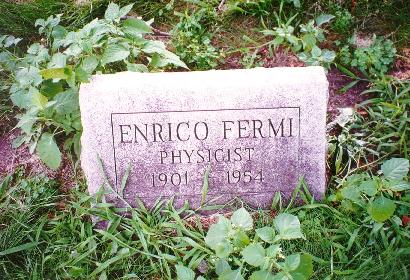
Enrico Fermi is known as the "father of the atomic bomb".
Born Sept. 29, 1901 in Rome, Fermi attended the University of Pisa.
He became a professor of theoretical physics at the University of Rome
in 1927. While there, he discovered a method of splitting a uranium
atom by bombarding the nucleus with neutrons. For this, he was
awarded the
Nobel Prize for Physics
![]() in 1938.
After travelling to Sweden with his family to accept the prize, Fermi
chose not to return to Fascist Italy, but instead went to London. In 1939,
he came to the United States and taught at Columbia University.
in 1938.
After travelling to Sweden with his family to accept the prize, Fermi
chose not to return to Fascist Italy, but instead went to London. In 1939,
he came to the United States and taught at Columbia University.
Fermi was placed in charge of the Manhattan Project at the
University of Chicago
![]() in 1942, where he led the research that gave rise to the first
atomic bomb. In a laboratory beneath the football stadium Fermi and his
colleagues created an atomic pile - graphite blocks, uranium, and
cadmium control rods. On December 2, 1942, the world's first
controlled nuclear reaction took place.
in 1942, where he led the research that gave rise to the first
atomic bomb. In a laboratory beneath the football stadium Fermi and his
colleagues created an atomic pile - graphite blocks, uranium, and
cadmium control rods. On December 2, 1942, the world's first
controlled nuclear reaction took place.
The project was moved to New Mexico in 1944, and on July 16, 1945, the first atomic bomb was detonated at Alamogordo Air Base. Three weeks later, bombs were dropped on Hiroshima and Nagasaki, ending World War II.
Fermi returned to the University of Chicago until his death of cancer on November 28, 1954.



